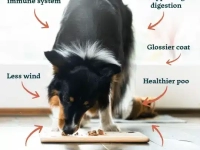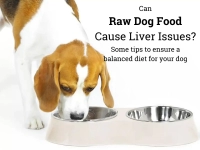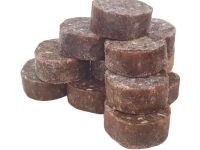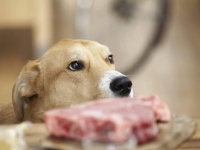Is Raw Dog Food the Secret to Happiness for Senior Dogs?
In This Article...
THE OVERVIEW...
As our beloved canine companions gracefully age, their nutritional needs evolve, much like the ever-changing landscape of fashion. Conscientious dog owners in New Zealand, often unsure of top pet care advice, seek the best for their furry family members. The question arises: Is raw dog food suitable for senior dogs? Here we aim to make it clear, the suitability—and potential benefits—of a raw diet for our older furry friends.
Understanding Senior Dog Nutrition
What Makes Senior Dogs Unique
Senior dogs, much like older humans, have their own set of quirks and requirements. As they enter their golden years, their metabolism slows, energy levels dip, and various health concerns, such as arthritis or kidney issues, may emerge. Tailoring their nutrition becomes paramount—not just for longevity but for quality of life.
Common Nutritional Needs for Senior Dogs
- Protein: Essential for maintaining muscle mass.
- Fibre: Aids digestion and promotes gut health.
- Vitamins and Minerals: Support overall wellness and immune function.
- Hydration: Often overlooked, but crucial for senior dogs.
The Raw Dog Food Diet: An Overview
What is Raw Dog Food?
Raw dog food, often touted as the ‘natural’ choice, consists of uncooked meat, bones, and organs. This approach embraces the BARF (Biologically Appropriate Raw Food) diet, which aligns closely with a dog’s ancestral eating habits, or the Prey Model diet, which mimics the consumption of whole prey.
Benefits of Raw Dog Food for Senior Dogs
Imagine a world where your senior dog boasts improved digestion, a luxurious coat, and increased vitality. The benefits of raw feeding are numerous:
- Enhanced Digestion: Raw diets can lead to better nutrient absorption.
- Joint Health: The right balance of nutrients can help ease arthritis pain.
- Weight Management: Maintaining a healthy weight is crucial as dogs age. It’s often slimmer than you would think.
- Energy Levels: A raw diet may help even the most sluggish of seniors.
Potential Concerns and Misconceptions
Is Raw Dog Food Safe for Senior Dogs?
Safety is a common concern among dog owners contemplating a raw diet. Issues such as bacteria, parasites, and proper food handling often surface. The key? Sourcing quality ingredients and practicing good hygiene when preparing the food at home.
Common Misconceptions about Raw Feeding
Let’s check a few myths:
-
- Myth: Raw diets are inherently dangerous.
- Fact: With proper handling and sourcing, raw feeding can be safe and beneficial.
- Myth: Raw diets are missing key nutrients.
- Fact: Balance is key for any diet. At Kuri we have a range of recipes including chicken, venison, and lamb as the main protein sources so you can mix it up and meet your senior dog’s nutritional requirements.
Expert insights suggest that when done correctly, raw feeding can significantly enhance the health of senior dogs.
Transitioning to a Raw Diet
How to Transition Your Senior Dog to Raw Food
Transitioning your senior dog to a raw diet requires patience and care. Follow these steps:
-
-
- Start by introducing small amounts of raw food mixed with their current kibble.
- Gradually increase the proportion of raw food over several days.
- Monitor your dog’s health and behaviour throughout the process.
-
Signs of a Successful Transition
Look for improvements in your dog’s coat, energy levels, and digestion. If your dog appears lethargic or has digestive issues, consider consulting an holistic veterinarian.
Product Recommendations for Raw Dog Food in New Zealand
Top Raw Dog Food Recipes for Senior Dogs
For discerning dog owners, several reputable brands cater to the raw feeding trend:
-
-
- Ultimate Raw Dog Food – A top choice for its balanced formulations.
- Rabit Heart and Tripe – A great starter choice due to the inclusion of tripe for digestive health.
- Lamb and Salmon – Perfect for a senior dog that needs to put on a little weight.
- Rabit Heart and Tripe – A great starter choice due to the inclusion of tripe for digestive health.
- Ultimate Raw Dog Food – A top choice for its balanced formulations.
-
Where to Buy Raw Dog Food in New Zealand
Whether online or at local pet stores, sourcing raw dog food has never been easier. Ensure you choose vendors who prioritise quality and transparency.
Expert Opinions and Case Studies
Veterinarian Insights on Raw Feeding for Seniors
Veterinarians with a focus on canine nutrition often recommend raw diets for their holistic benefits. Anecdotal evidence from pet owners illustrates a remarkable turnaround in the health of senior dogs who made the switch.
Conclusion
As we’ve explored, raw dog food can be a viable option for enhancing the well-being of senior dogs, providing them with the nutrition they need to thrive in their twilight years. If you’re contemplating this dietary shift, consulting with your veterinarian is a wise first step.
Ready to embark on this culinary adventure for your furry friend? Consider the possibilities of raw feeding—it might just be the secret ingredient to a happier, healthier life for your senior dog.
Additional Resources
FAQ Section
Q: Can senior dogs eat raw bones?
A: Yes, but ensure they are appropriate for their size and dental condition.
Q: How can I tell if my dog is thriving on a raw diet?
A: Look for improvements in energy, coat condition, and overall health.
Have more questions? Share your thoughts, and let’s continue the conversation about giving our senior dogs the quality of life they deserve!








